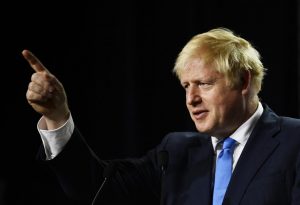

BORIS Johnson promised his government would “unleash” the potential of British business, once he has fulfilled his core campaign promise to “get Brexit done”.

Britain’s Prime Minister Boris Johnson
But for business leaders, many of whom lobbied against Brexit, the pledge means that they will soon have to adapt to a more distant relationship with the UK’s largest trading partner. Analysis suggests that new trade deals further afield are unlikely to compensate for the economic impact of this shift.
With an 80-seat majority, there is little doubt that Johnson will be able to get his Withdrawal Agreement through Parliament, paving the way for the UK to leave the European Union. The prospect of an end to three years of to and fro over the issue is welcomed by the deputy director general of the CBI, Josh Hardie.
“Just the fact that we have a government with a strong majority and a mandate actually provides the opportunity to bring a bit more certainty,” he said.
Hardie said British businesses would like see maximum alignment with the bloc, describing a relationship of frictionless trade very similar to EU membership, but the new government has promised an arms length arrangement, with the UK outside both the EU single market and the customs union.
Mike Cherry, the national chairman of the Federation of Small Businesses, said Brexit could provide an opportunity for British firms to expand into other overseas markets such as the US, Canada and Australia. But the UK’s relationship with the EU remains the first item on the agenda.
There is an expectation that the previous Conservative government’s Northern Powerhouse plans will get further backing. The Times has suggested the prime minister could be planning to pump as much as £80bn into projects in key northern seats in a bid to cement his new voters’ support.
But Jasmine Whitbread, chief executive of the lobby group London First, also put in a bid for more schemes in the south of England — if the prime minister has his wallet out anyway.
“The Conservative manifesto recognised the role for vital infrastructure in supporting the economy, from Northern Powerhouse Rail to gigabit broadband. The government now should go further and give clear backing to HS2 and Crossrail 2, as well as reaffirming support for airport expansion at London’s airports, putting in place the key building blocks needed to enable our regions to grow together.”
That kind of spending may help boost the UK’s flagging growth rates, says Yael Selfin, chief economist at accountancy firm KPMG. She says “public spending will need to do the heavy lifting” when it comes to dispelling the cloud of uncertainty around an EU deal but it will take more than that.
Johnson has pledged to introduce a points-based immigration system that would sort migrant workers into three categories.
The first tier, entrepreneurs, investors and people who have won awards in certain fields, would receive fast-track entry under the system.
Meanwhile, skilled workers, such as doctors, nurses and other health professionals, who have a confirmed job offer, would be placed in another category, with those eligible for an NHS visa also receiving fast-track entry and reduced fees.
For low-skilled or unskilled workers, sector-specific rules would be put in place, enabling British firms to fill gaps where UK workers cannot be found. But the plans have come under fire from business leaders who have said the proposed policy is too vague and would affect their ability to plan for the future.
The CBI’s Hardie said while a points-based system could work if designed to respond to the needs of the economy, but more detail would be welcome. — BBC